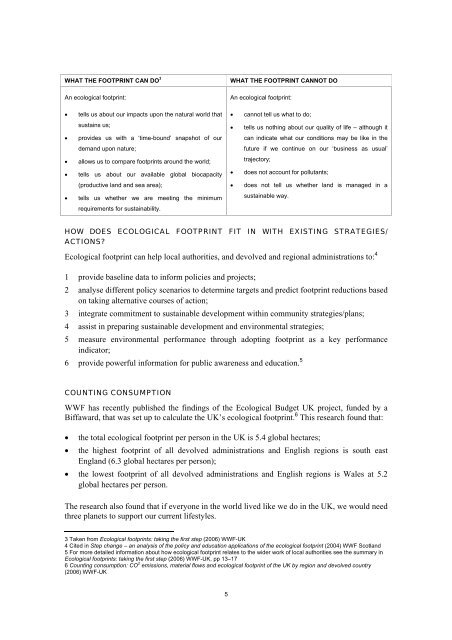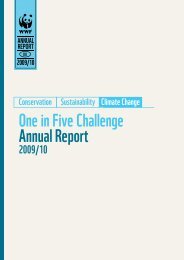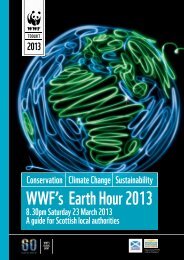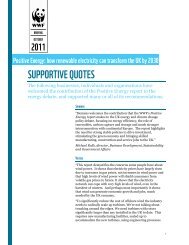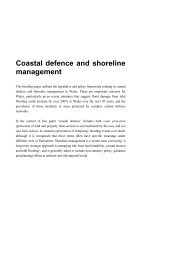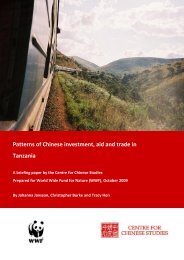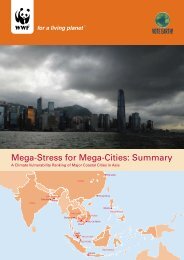Ecological footprint: taking the next step - WWF UK
Ecological footprint: taking the next step - WWF UK
Ecological footprint: taking the next step - WWF UK
You also want an ePaper? Increase the reach of your titles
YUMPU automatically turns print PDFs into web optimized ePapers that Google loves.
WHAT THE FOOTPRINT CAN DO 3An ecological <strong>footprint</strong>:• tells us about our impacts upon <strong>the</strong> natural world thatsustains us;• provides us with a ‘time-bound’ snapshot of ourdemand upon nature;• allows us to compare <strong>footprint</strong>s around <strong>the</strong> world;• tells us about our available global biocapacity(productive land and sea area);• tells us whe<strong>the</strong>r we are meeting <strong>the</strong> minimumrequirements for sustainability.WHAT THE FOOTPRINT CANNOT DOAn ecological <strong>footprint</strong>:• cannot tell us what to do;• tells us nothing about our quality of life – although itcan indicate what our conditions may be like in <strong>the</strong>future if we continue on our ‘business as usual’trajectory;• does not account for pollutants;• does not tell us whe<strong>the</strong>r land is managed in asustainable way.HOW DOES ECOLOGICAL FOOTPRINT FIT IN WITH EXISTING STRATEGIES/ACTIONS?<strong>Ecological</strong> <strong>footprint</strong> can help local authorities, and devolved and regional administrations to: 41 provide baseline data to inform policies and projects;2 analyse different policy scenarios to determine targets and predict <strong>footprint</strong> reductions basedon <strong>taking</strong> alternative courses of action;3 integrate commitment to sustainable development within community strategies/plans;4 assist in preparing sustainable development and environmental strategies;5 measure environmental performance through adopting <strong>footprint</strong> as a key performanceindicator;6 provide powerful information for public awareness and education. 5COUNTING CONSUMPTION<strong>WWF</strong> has recently published <strong>the</strong> findings of <strong>the</strong> <strong>Ecological</strong> Budget <strong>UK</strong> project, funded by aBiffaward, that was set up to calculate <strong>the</strong> <strong>UK</strong>’s ecological <strong>footprint</strong>. 6 This research found that:• <strong>the</strong> total ecological <strong>footprint</strong> per person in <strong>the</strong> <strong>UK</strong> is 5.4 global hectares;• <strong>the</strong> highest <strong>footprint</strong> of all devolved administrations and English regions is south eastEngland (6.3 global hectares per person);• <strong>the</strong> lowest <strong>footprint</strong> of all devolved administrations and English regions is Wales at 5.2global hectares per person.The research also found that if everyone in <strong>the</strong> world lived like we do in <strong>the</strong> <strong>UK</strong>, we would needthree planets to support our current lifestyles.3 Taken from <strong>Ecological</strong> <strong>footprint</strong>s: <strong>taking</strong> <strong>the</strong> first <strong>step</strong> (2006) <strong>WWF</strong>-<strong>UK</strong>4 Cited in Step change – an analysis of <strong>the</strong> policy and education applications of <strong>the</strong> ecological <strong>footprint</strong> (2004) <strong>WWF</strong> Scotland5 For more detailed information about how ecological <strong>footprint</strong> relates to <strong>the</strong> wider work of local authorities see <strong>the</strong> summary in<strong>Ecological</strong> <strong>footprint</strong>s: <strong>taking</strong> <strong>the</strong> first <strong>step</strong> (2006) <strong>WWF</strong>-<strong>UK</strong>, pp 13–176 Counting consumption: CO 2 emissions, material flows and ecological <strong>footprint</strong> of <strong>the</strong> <strong>UK</strong> by region and devolved country(2006) <strong>WWF</strong>-<strong>UK</strong>5


